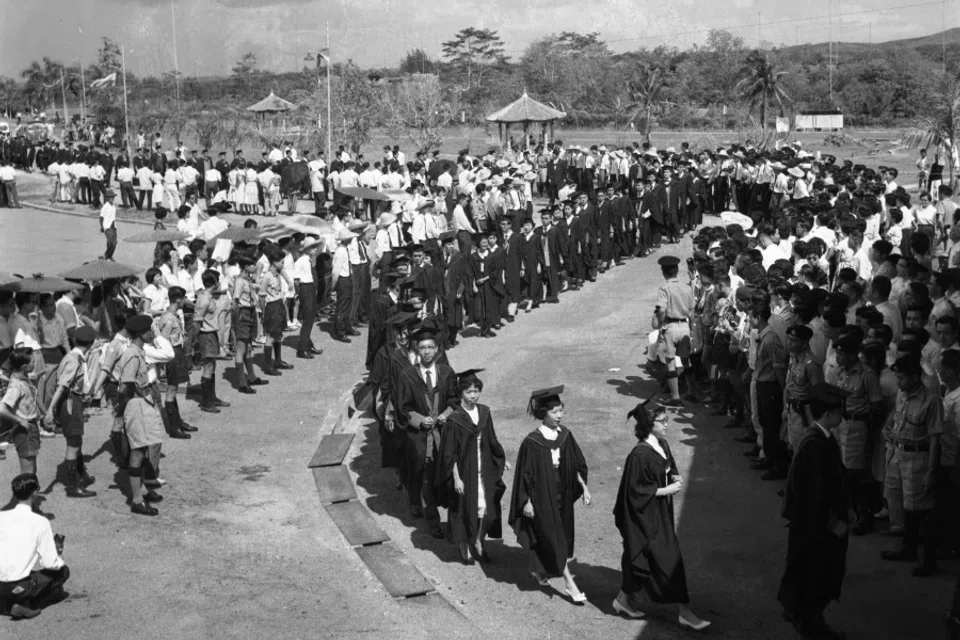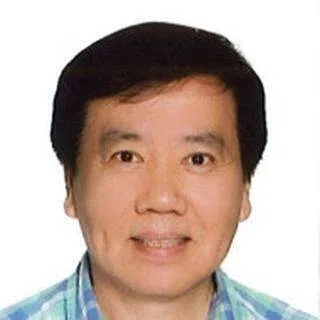Memories of graduating in a tent at Nanyang University
Hua Language Centre director Chew Wee Kai thinks back to the first time he attended a university graduation - in a tent. However, the solemnity of the event still shone through, in a fitting tribute to the effort of the graduates, as well as the travails of that storied university called Nanyang University (Nantah), and all that it came to represent.

The other night, I was watching the documentary The Songs We Sang when I was hit by a wave of nostalgia at a scene of a graduation ceremony at Nanyang University (Nantah), held outdoors in a makeshift tent. For an institution with no auditorium, this open-air scene exudes hope, like trekking through long snowy nights, or spending a decade honing one's sword and skills.
Going further back, I recalled the first such graduation I witnessed as a seven-year-old. It was for the first batch of Nantah students, which meant it got plenty of press coverage. The event actually had nothing to do with a little twerp like me - none of my relatives or neighbours was graduating after closeting themselves away for a period of hard study - but I still got in on the action, thanks to my second uncle.
He came to Nanyang (Southeast Asia) alone. In his younger days, he was a cook with the British army, and on his days off, he stayed at my home, where we shared a bed. The day before the Nantah graduation, he chirpily said he would take me to Nantah to catch the action. This would be his second time at Nantah's landmark Yunnan Garden - the last time he was there was when Nantah was completed. I seldom got a chance to get out and about, so of course I accepted my uncle's invitation.
A respect for learning and the learned
I stuck close to him as we arrived at Yunnan Garden, which was teeming with what seemed to me like thousands of people. The library (now the Chinese Heritage Centre, with its classical Chinese architecture) had a large tent set up in front of it, filled with guests and graduates in their gowns and tasselled hats; outside the tent was a full crowd of sweaty spectators.
It was only when I grew up that I understood - his attendance was a strong show of support for this hallowed hall of learning, even if the ceremony had nothing to do with him personally.

At the time, I did not understand the significance of the ceremony. All I knew was, that was the first time I was seeing so many people in black robes and graduation caps. A sense of solemnity welled up within me, and I thought to myself that they must be very clever to look so grand now.
The sight of the line of graduates going up to receive their certificates called to my mind the image of the owl I saw in a children's illustrated periodical, wearing a graduation cap as it was named the most learned creature in the forest - I decided that these black-robed, tassel-capped young people were clearly among the learned.
I watched as they collected their certificates, filed towards Yunnan Garden in front of the library and came down the steps past the Founders' Memorial, then looped back to the tent and resumed their seats.

This was Uncle's first time at a university graduation ceremony. It was only when I grew up that I understood - his attendance was a strong show of support for this hallowed hall of learning, even if the ceremony had nothing to do with him personally.
In those days of messy political identities, the Chinese community - always busily scrambling about their everyday lives - felt an undefinable sense of protectiveness towards Nantah. From conception to birth and growth, everything about it was contrary. It was a rare community effort outside of the system, which galvanised a movement of self-sufficiency and brought the harmonious chords of education to the grassy knolls of Jurong. Within those who came to witness the ceremony was the joy of rain after a drought.
Emotional connections
Having seen the institution fight its way forward through heavy weather, most people - whether uneducated and illiterate or cultivated and refined - could identify with how it came to be. With firsthand contact comes a sense of connection; the heart swells with elegies of emotion as one worries about a difficult birth, internal injuries, malnutrition - and in the end the "baby" still dies in his twenties, just as Nantah only lasted 24 years.
These "uniquely Nantah" tent graduations lasted for four or five years, reminding people of the tough road Nantah had traversed, like someone in torn clothes battering their way through a mountain forest.

These "uniquely Nantah" tent graduations lasted for four or five years, reminding people of the tough road Nantah had traversed, like someone in torn clothes battering their way through a mountain forest. The simple ceremonies harked back to the clumsy wooden schools that populated Southeast Asia; while they were not grand, they brought out the spirit of going against the odds.
In 1965, the year of Singapore's independence, Nantah's sixth graduating class had its ceremony at the National Theatre, and the tents became a thing of the past. And in 1969, Nantah's tenth batch finally had its ceremony in the brand-new auditorium or graduation hall on campus, called 建国堂 in Chinese (Jianguo Tang, lit. Nation-building Hall).

When I spoke to the third- and fourth-batch graduates about their ceremonies in the tents, most of them remembered the calligraphy "长风万里大业千秋" (chang feng wan li da ye qian qiu) running down either side of the stage. The words translate into: "The constant wind blows over ten thousand li (里, a Chinese unit of measurement); a major endeavour lasts for a thousand autumns." Everyone was keen to know who came up with those eight grandiose words that fit so well the Nantah spirit of swimming against the current - but until now, that person's identity remains unknown.
The calligrapher was Lim See Young from the Math faculty. The year he joined Nantah, even before term began, he was selected by the student council to write those words to be used at "University Week". They were then hung for two years at the tent graduations, prominent and inspiring.
Serenity a memory
Now, with education so widespread, university students are no longer a rare commodity, but photographs of university graduations with students in their robes and hats are still a stand-out part of any album, even more impressive than overseas travel photos. But with Covid over the past few years, graduations have been delayed due to control measures, and it is a pity to miss the live atmosphere.

Each era has its achievements. Looking around the world, in recent years the solemn graduation ceremony has seen some eye-catching but incongruous scenes of people using their graduation to raise various demands: protesting police violence, the death penalty, bans against face coverings, vaccinations, guest speakers... the solemnity of university graduation has been tarnished.
Looking back, the simplicity of the Nantah tent graduations has quietly settled to the bottom of our box of collective memories.



![[Photos] Fact versus fiction: The portrayal of WWII anti-Japanese martyrs in Taiwan](https://cassette.sphdigital.com.sg/image/thinkchina/3494f8bd481870f7c65b881fd21a3fd733f573f23232376e39c532a2c7593cbc)

